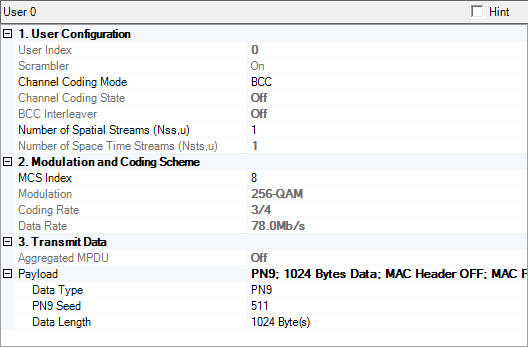

| Channel Coding Mode | |
Displays the index for each user.
Choice: On|Off
Default: On
Enable or disable the . scrambles the data to reduce the probability of long sequences of zeros and ones.
The is fixed to be ‘ON’ when the Capability is set to be Basic.
Choice: BCC|LDPC
Default: BCC
Select the Channel Coding mode that encodes the data to enable error correction.
Default: Off
Channel Coding State is set to OFF and cannot be turned ON when Capability is set to Basic. When Channel Coding State is OFF, both the BCC encoder and LDPC encoder are bypassed.
Choice: On|Off
Default: Off
Enable or disable the interleaver. interleaves the bits of each spatial stream(changes order of bits) to prevent long sequences of adjacent noisy bits from entering the BCC decoder. Interleaving is applied only when BCC encoding is used.
BCC Interleaver is fixed to OFF when Capability is set to Basic. It’s only visible when the Channel Coding Mode is BCC.
Its maximum value depends on the Transmission Mode and STBC as below table show.
|
Max. Nss |
Single User |
Multi User |
|---|---|---|
|
STBC ON |
4 |
2 |
|
STBC OFF |
8 |
4 |
Set the number of Spatial Streams used by current user. Its maximum value is 8 for Single User, while it's 4 for Multi User.
Displays the number of Space Time Streams for the current user.
When is OFF, it is equal to the Number of Spatial Streams. When STBC is ON, it is equal to two times the Number of Spatial Streams. Its initial value is equal to the Number of Transmit Chains so that the initial Spatial Mapping Scheme can be “Direct Mapping”.
Select the MCS Index. Please note that some MCS Index values are defined in the standard to be invalid for certain combinations of bandwidth and number of spatial streams Nxx. They are not selectable.
Displays the modulation format defined for the selected MCS (Modulation and Coding Scheme) Index value.
Displays the coding rate determined by MCS index.
Displays the data rate determined by MCS index.
Default: Off
Aggregated MPDU is set to OFF when Capability is set to Basic. When Aggregated MPDU is OFF, only one MPDU is used as the payload.
Configure Payload in the following cells.
Choices: All 0s | PN9 | PN15 | User File
Default: PN9
Select the payload bits stream. This is the actual user data carried by a frame.
Range: 0 to 511
Default: 511
Specify a seed in decimal format to generate a PN9 data sequence. The LSB of the seed comes out first. For example, if you enter a seed value of 10 (1010 in binary), the first 9 bits of the PN9 sequence are 0 1 0 1 0 0 0 0 0, with an increasing index from left to right. For more information, see PN Sequence Generation.
PN9 Seed only appears when Data Type is PN9.
Range: 0 to 32767
Default: 32767
Specify a seed in decimal format to generate a PN15 data sequence. The LSB of the seed comes out first. For example, if you enter a seed value of 10 (1010 in binary), the first 15 bits of the PN15 sequence are 0 1 0 1 0 0 0 0 0 0 0 0 0 0 0, with an increasing index from left to right. For more information, see PN Sequence Generation.
PN15 Seed only appears when Data Type is PN15.
Set the number of data bytes in the payload. The value is limited by the MPDU Length.
Coupling: User File only appears when Data Type is User File.
Click the  button in this cell to select a user file
as the data source.
button in this cell to select a user file
as the data source.
The user file must be in binary form. The least significant bit (LSB) of the first byte in the user data file will be the first bit of the user payload; the LSB of the second byte in the user file will be the ninth bit of the user payload, and so on. If User file is selected as the Data Type, the value displayed in the Data Length field will be equal to the length of the user's data file, up to the maximum data length.
Displays the User File Length in bytes.
User File Length only appears when Data Type is User File.